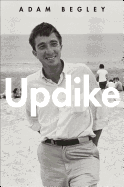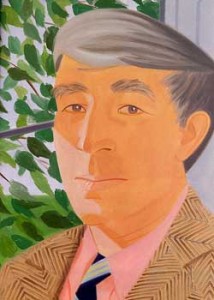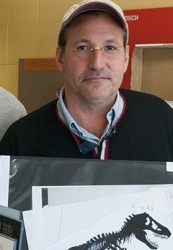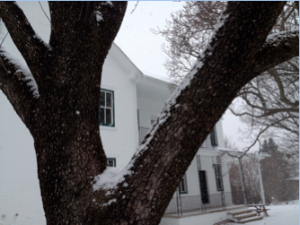Today, Berks-Mont News featured an article on the restoration of The John Updike Childhood Home, written by Emily Thiel, editor of The Southern Berks News and Community Engagement Editor for Berks-Mont Newspapers:
Author Archives: James Plath
Updike would have turned 82 today
 John Updike would have turned 82 today, and while there aren’t a lot of birthday tributes on the Internet now, in 2010 a site devoted to famous persons’ birthdays featured Updike:
John Updike would have turned 82 today, and while there aren’t a lot of birthday tributes on the Internet now, in 2010 a site devoted to famous persons’ birthdays featured Updike:
“Happy Birthday, John Updike, Prolific Novelist, Critic and Poet”
Begley to speak at 92Y NYC event
 So where will Adam Begley be on April 8, the day his biography Updike is published?
So where will Adam Begley be on April 8, the day his biography Updike is published?
At least one event has been announced. Begley, who will be a keynote speaker at the Third Biennial John Updike Society Conference at Alvernia University in Reading, Pa. the first week in October, will give a talk at 92Y, Lexington Ave. at 92nd St., New York City. Tickets are available for his noon presentation, starting at $21.00.
Here’s the link.
De Bellis: Updike’s first biographer gets a gold medal
 “Updike’s First Biographer Gets a Gold Medal”
“Updike’s First Biographer Gets a Gold Medal”
By Jack De Bellis
February 20, 2014
Rev. of Adam Begley’s Updike. [New York]: HarperCollins, [2014].
John Updike famously wrote his memoir Self-Consciousness to discourage potential biographers while he lived. Now, five years after Updike’s death, Adam Begley, whose father was Updike’s Harvard classmate, has given us a comprehensive, perceptive, handsomely written critical biography. Updike owes its success to Begley’s studious use of the Houghton Library’s trove of Updike material, his tireless leg-work in interviewing relatives, friends, lovers, and writers, and his judicious evaluation of Updike’s oeuvre. Begley authoritatively dates Updike’s canon and precisely charts his timeline. For instance, though Marry Me was published in 1976, Begley shows it was written in 1964, and while Updike divorced in 1976, Begley reveals that he nearly left his family in 1962.
Begley’s exactitude is formidable: Shillington’s parking meters first appeared in 1940; Updike made $1,003 from The New Yorker in 1954; Joyce Harrington was the married woman for whom he nearly divorced in 1962; Madeline and Medea were the names of Miranda Updike’s two sheep; and Rosette was the Updikes’ Antibes babysitter. But does the reader need to know that an Updike Ipswich home had been owned in the thirties by George Brewer Jr. “who co-wrote Dark Victory,” later a Bette Davis film? Well, after such scholarly excavation, Begley can be forgiven his passion for detail.
So Begley is factually trustworthy, and so are his informed readings of Updike’s work—and his observations of Updike the man, as his “Introduction” discloses. In 1993 he witnessed Updike’s encounter with a meddlesome woman, and Begley cleverly perceived Updike’s spectrum of responses as he reacted. Right away we know we are in the hands of writer with sharp eyes and a shrewd mind. Updike will grab casual readers and be indispensable to specialists. Continue reading
UPDIKE, by Adam Begley: reviews
 The reviews have started coming in for Adam Begley’s much-anticipated biography of John Updike, titled, simply, Updike. The 576-page book will be published by HarperCollins on April 1, 2014. More reviews will be added as we become aware of them, organized by publication date, so check back.
The reviews have started coming in for Adam Begley’s much-anticipated biography of John Updike, titled, simply, Updike. The 576-page book will be published by HarperCollins on April 1, 2014. More reviews will be added as we become aware of them, organized by publication date, so check back.
“UPDIKE by Adam Begley.” Kirkus Reviews. January 20, 2014 (print version February 1, 2014). “A sympathetic, full-meal-deal biography—life, literary works, reputation—of John Updike (1932-2009), who was considered by many to be the most talented of his generation. . . . Thorough, intelligent and respectful, but more bite would have released more of Updike’s blood.”
“Updike.” Goodreads. January 30, 2014. “With a sharp critical sensibility that lends depth and originality to his analysis, Begley probes Updike’s best-loved works—from “Pigeon Feathers” to The Witches of Eastwick to the Rabbit tetralogy—and reveals a surprising and deeply complex character fraught with contradictions: a kind man with a vicious wit, a gregarious charmer who was ruthlessly competitive, a private person compelled to spill his secrets on the printed page. Updike offers an admiring yet balanced look at this national treasure, a master whose writing continues to resonate like no one else’s.”
“Begley: UPDIKE; Random Notes on Adam Begley’s UPDIKE, Part 1.” Peter Quinones. Postmodern Deconstruction Madhouse. February 5, 2014. “Begley devotes one paragraph to the only major Hollywood studio release based on Updike’s fiction, The Witches of Eastwick. What?! No juicy tale of ‘Updike in Hollywood’? He mentions Updike and his wife got to see the picture by sneaking into an afternoon showing at the mall . . . again, what?! What’s the story behind that?”
“Updike.” Publishers Weekly. February 17, 2014. “Without always matching the laborious detail of Jack De Bellis’s John Updike’s Early Years (2013), this comprehensive account from literary critic Begley draws on deep research and interviews with the author and his circle . . . . Begley (whose father was a Harvard classmate of Updike’s) marshals revealing commentary by Updike’s contemporaries, like college roommate and future historian Christopher Lasch, who discuss the hesitations and insecurities hounding him.”
“De Bellis: Updike’s first biographer gets a gold medal.” Jack De Bellis. The John Updike Society. February 20, 2014. “Updike owes its success to Begley’s studious use of the Houghton Library’s trove of Updike material, his tireless leg-work in interviewing relatives, friends, lovers, and writers, and his judicious evaluation of Updike’s oeuvre.”
Updike at the National Portrait Gallery
 In January 2009, the National Portrait Gallery wrote about Updike and the Alex Katz portrait of him that’s on display in Washington, D.C. and posted it on their facetoface blog.
In January 2009, the National Portrait Gallery wrote about Updike and the Alex Katz portrait of him that’s on display in Washington, D.C. and posted it on their facetoface blog.
Readers will recognize the portrait as the one from the October 18, 1982 edition of Time magazine. It’s not exactly breaking news, but members headed for the American Literature Association conference in Washington, D.C. this May might be interested to read up on the painting before visiting the National Portrait Gallery.
And Updike fans who don’t know the story behind the cover might find it fascinating. Time donated the oil-on-canvas, which they had commissioned, to the Gallery. Look for it in the 20th Century Americans exhibition on the third floor. The blog post includes a reprint of an article that Frederick Voss, a former historian at the National Portrait Gallery, wrote about the Updike portrait for the museum’s Profile magazine (Spring 2003).
Here’s a link to the full facetoface blog post: “John Updike: March 18, 1932 – January 27, 2009.”
The Other John Updike Archive to remain open
Collector Paul Moran writes that The Other John Updike Archive, a blog he started in order to share some of his treasures with the world, will remain open.
“After much vetting of copyright legalities I am satisfied that The Other John Updike Archive is now in conformity with copyright laws,” he writes. “The site will remain as a kind of U-seum. Possible updates like the article on my collection in yesterday’s Austin American-Statesman will be included.”
Keynote speakers and call for papers announced for Third Biennial John Updike Society Conference
 Alvernia University of Reading, Pa., will host the Third Biennial John Updike Society Conference October 1-4, 2014, and the keynote speakers are set.
Alvernia University of Reading, Pa., will host the Third Biennial John Updike Society Conference October 1-4, 2014, and the keynote speakers are set.
On Thursday evening, October 2, Chip Kidd will deliver the first keynote talk. Kidd has been called the “rock star” of graphic designers because he has crafted so many iconic images, among them the cover for Michael Crichton’s Jurassic Park and, of course, many of John Updike’s dust jackets. He interacted with Updike over the artwork and can offer a great many insights. For those who want to read more, we recently ran a story on Penn State’s University Libraries acquisition of the Chip Kidd archives.
 Adam Begley, who wrote the first full-length biography on Updike (published in April, 2014) will deliver the second keynote talk on Saturday, October 4. To quote the HarperCollins website, “Updike is Adam Begley’s masterful, much-anticipated biography of one of the most celebrated figures in American literature: Pulitzer Prize-winning author John Updike—a candid, intimate, and richly detailed look at his life and work.”
Adam Begley, who wrote the first full-length biography on Updike (published in April, 2014) will deliver the second keynote talk on Saturday, October 4. To quote the HarperCollins website, “Updike is Adam Begley’s masterful, much-anticipated biography of one of the most celebrated figures in American literature: Pulitzer Prize-winning author John Updike—a candid, intimate, and richly detailed look at his life and work.”
From Kirkus Reviews: “A sympathetic, full-meal-deal biography—life, literary works, reputation . . . . Former New York Observer books editor Begley (Certitude: A Profusely Illustrated Guide to Blockheads and Bullheads, Past and Present, 2009, etc.) erects his formidable artifice on a sturdy foundation of research and convention. He interviewed the relevant relatives and friends, trod the ground in Pennsylvania (Updike’s state of birth and youth), Massachusetts and elsewhere, and read all the works of Updike’s most prolific career.”
 Program director Maria Mogford has issued a Call for Papers. One-page proposals/abstracts for 15-20 minute papers should be titled “Updike Conference Proposal” and emailed by May 15, 2014 to program director Maria Mogford at mmogford@alb.edu. Decisions on panels and panelists will be announced no later than June 15, 2014, with rolling acceptances—meaning the sooner you get your proposal in, the sooner you’ll hear back from Maria. Moderators are also needed. See the Call for Papers for details.
Program director Maria Mogford has issued a Call for Papers. One-page proposals/abstracts for 15-20 minute papers should be titled “Updike Conference Proposal” and emailed by May 15, 2014 to program director Maria Mogford at mmogford@alb.edu. Decisions on panels and panelists will be announced no later than June 15, 2014, with rolling acceptances—meaning the sooner you get your proposal in, the sooner you’ll hear back from Maria. Moderators are also needed. See the Call for Papers for details.
While Mogford and site director Sue Guay, another longtime member and a professor of English at Alvernia, are still finalizing plans, some of the events for this year’s conference include:
- A tour and reception at the Reading Museum and Arboretum (on display is The Drinking Girl as cited in The Centaur).
- “A Soft Spring Night in Shillington” tour and reception at The John Updike Childhood Home (pictured), the first time a large-scale event will be held at the house, which is owned by the society and is currently being renovated.
Member elicits responses from Updike readers
Member John McTavish is eliciting responses from John Updike readers regarding such questions as how they discovered JU, their favorite JU book (and why), which book (and why) they would recommend to new readers, and a memorable line (or lines, or paragraph) from JU.
“I hope to collate the results of the survey and publish them,” McTavish says, “but publish or not, I will email a copy of the accumulated results to all the participants.”
McTavish says he’s already received some “sparkling replies” from a number of people, including Don Greiner, Jack De Bellis, and Biljana Dojcinovic. Send your responses to him at: jmctav@vianet.ca
Panels set for May ALA conference in Washington, D.C.
 Scott Dill, who put out the call for papers and assembled the panels for the Society’s annual participation at the American Literature Association Conference, has announced that the panels are set:
Scott Dill, who put out the call for papers and assembled the panels for the Society’s annual participation at the American Literature Association Conference, has announced that the panels are set:
Updike and the Short Story: Vol. 1
Chair: Matthew Shipe, Washington University
- “Making the Images Move: A Certain Continuity in John Updike’s Short Fiction,” Kanqin Li, University of Leicester
- “Updike in His Times: History and Autobiography in the Fiction,” Kathleen Verduin, Hope College
- “The John Updike Childhood Home and His Short Fiction,” Maria Mogford, Albright College
Updike and the Short Story: Vol. 2
Chair: Scott Dill, University of North Carolina at Chapel Hill
- “Mind Games Forever: Masculine Self-Delusion in ‘The Morning’ and ‘Slippage,'” Peter Bailey, St. Lawrence University
- “Updike on Religion after 9/11,” Liliana Naydan, University of Michigan
- “Life after Sex?: Memory and the Diminished Present in John Updike’s Late Short Fiction,” Matthew Shipe, Washington University
The idea for the panels was inspired by the recent publication of the Library of America two-volume set of John Updike’s short stories. Thanks to Scott and congratulations to all who had papers accepted.
Times have not been set yet, but the 25th Annual ALA Conference will be held at the Hyatt Regency Washington on Capitol Hill from May 22 through May 25. You must register and pay the conference fee to attend.
